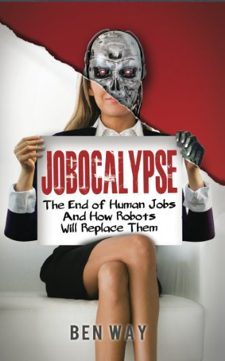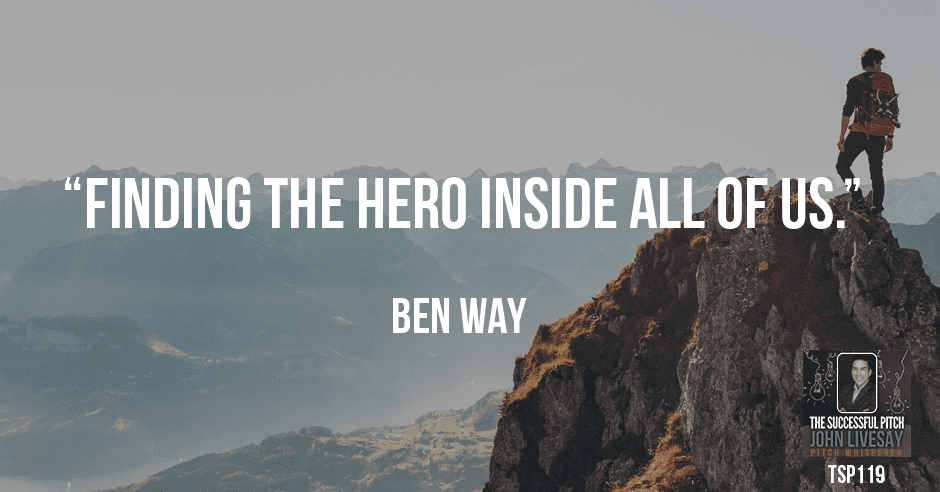Finding The Hero Inside All Of Us with Ben Way
Posted by John Livesay in podcast0 comments
Episode Summary
 Today’s guest on The Successful Pitch is Ben Way. He wrote a book about robots taking over our jobs and he’s working on a second book about artificial intelligence becoming artificial consciousness But he’s got an incredible story beyond all those accomplishments, which includes going to the White House, raising a lot of money, being named one of the most influential entrepreneurs of 2016 from the UK, he’s the co-founder, COO of Digitzs company that is disrupting the way we’re going to be making payments in the future, and he said, “when you have a pitch,” and he hears lots of them, as he also runs his own incubator, “you need to be concise, you need to show traction, and you need to have a team.” Be, show, and have. Really great advice there. And he also talks about selling a dream, and that’s the best way to get the best people on your team. Enjoy the episode.
Today’s guest on The Successful Pitch is Ben Way. He wrote a book about robots taking over our jobs and he’s working on a second book about artificial intelligence becoming artificial consciousness But he’s got an incredible story beyond all those accomplishments, which includes going to the White House, raising a lot of money, being named one of the most influential entrepreneurs of 2016 from the UK, he’s the co-founder, COO of Digitzs company that is disrupting the way we’re going to be making payments in the future, and he said, “when you have a pitch,” and he hears lots of them, as he also runs his own incubator, “you need to be concise, you need to show traction, and you need to have a team.” Be, show, and have. Really great advice there. And he also talks about selling a dream, and that’s the best way to get the best people on your team. Enjoy the episode.
Listen To The Episode Here
Finding The Hero Inside All Of Us with Ben Way
 Hello and welcome to today’s episode of The Successful Pitch. I’m very excited to have Ben Way on the show. Ben is a serial entrepreneur and a best-selling author who is best known for his appearance on Secret Millionaire, the Startup Kids, and he was a cast member on Start-ups: Silicon Valley. He started his first company at the young age of 15 and he’s gone on to raise over £25 million in his teens. Yes, he is from the UK and that made him one of the first dot-com millionaires. His first book was “Jobocalypse,” which is taking the concepts of apocalypse and putting it into the job world, he’s got a second book coming out that he’s going to share with us what he’s doing. And most interestingly, he’s involved with a new company called Digitzs, which is disrupting the whole way we pay for things. Ben, welcome to the show.
Hello and welcome to today’s episode of The Successful Pitch. I’m very excited to have Ben Way on the show. Ben is a serial entrepreneur and a best-selling author who is best known for his appearance on Secret Millionaire, the Startup Kids, and he was a cast member on Start-ups: Silicon Valley. He started his first company at the young age of 15 and he’s gone on to raise over £25 million in his teens. Yes, he is from the UK and that made him one of the first dot-com millionaires. His first book was “Jobocalypse,” which is taking the concepts of apocalypse and putting it into the job world, he’s got a second book coming out that he’s going to share with us what he’s doing. And most interestingly, he’s involved with a new company called Digitzs, which is disrupting the whole way we pay for things. Ben, welcome to the show.
Thank you very much.
I’d love to hear your story of origin. So how did you, at a young age of 15, decide that you were going to do your first startup?
Well, it actually came, like many of these things, quite accidentally. I had actually been pseudo running a business from the age of about nine because I grew up on a farm. And we had chickens, so I did a small cash up and I bought chickens and I sold their eggs.
Then luckily, or unluckily, depending on the way you look at it, I actually think luckily, I was diagnosed with dyslexia very early on. So I had severe problems reading and writing, etcetera, etcetera, early days of school and was given a laptop. And by getting that laptop, that kind of changed my life because back in the day, these laptops were very unusual so I got very good at computers at a very early age, and then people started asking me for help. And I thought, well I can charge, you know, 15 bucks an hour, and that was better than getting wet in a paper round every day, so that’s how I started a business.
I love it. It’s interesting because we always sometimes feel like we have some disadvantage, but you’ve been able to figure out a way to turn that into something that gave you some other focus that obviously you’ve been extremely successful. So you became this computer consultant at 15 and then you raised £25 million at 19. Were you living in the States when you did that?
No, no. I was actually in the UK–
But the company was based … the VCs that invested you were based in Jersey, is that right?
Yes, but there’s two Jerseys–
Got it. Fair enough. Well most venture capitalists or even angel investors I know are not, you know, it’s all about the team and so how did you overcome the objection of your age?
Well one of the beautiful things was, I mean first of all I couldn’t even understand why anybody would want to invest in me. I’d never considered investment, but I had happened to be on a very big TV show in the UK. And after that TV show, some investors rang me up and said, “We have money to spend, do you have any good ideas?” And I was like, “Well good ideas has never been the issue, so why don’t we talk?” And that’s how that started, so it’s always very different when a VC approaches you because they’ve already pre-qualified you.
Well, that’s the advantage of getting on television. I’ve done some television myself for my book and I know that once people see you on TV, it’s a whole other level of credibility. Well, the idea that you decided to create is online shopping comparison technology called Pulsar, which I think is really worth noting because that probably gave you some of the expertise for what you’re doing now at Digitzs, yes?
Indeed, indeed. You know, Pulsar was basically the first ever e-commerce search engine, so a bit like Google Shopping. So that gave me a lot of insight into the commerce space, and that’s why Digitzs is so exciting because Digitzs, really being focused with platforms and payments, really allows platforms and e-commerce synergies to do payments with a whole new set of tools at their disposal. So it’s not a space I ever thought I would be involved in, but when you’re actually involved in it, it’s fascinating.
Well, I would be remiss if I didn’t talk about the fact that you also won the New Business Millennium Young Entrepreneur of the year in 2000 by Gordon Brown giving you that. And then you’ve advised both the White House and the UK on technology. I don’t know that that is something that a lot of people can claim they’ve done both. So can you paint a picture for us of what it was like to go to the White House?
Yeah, well I mean it was quite funny because I’d been advising the US Embassy in the UK through the Undersecretary of Commerce Robert Shapiro and Robert called me up one day and said, “You know, we’re working on this thing called digital mobile.” Because this is back in the day when everything in the US was analog and we were digital in Europe. “Would you come over and have a chat to us about UTMS mobile technology?” And I was like, “Yeah sure.” So yeah, I’m basically a 17 or 18-year-old kid, in a suit with a briefcase walking up to the White House was an experience. Genuinely, it was one of the proudest moments of my life. I was very proud to represent my country and help your country, in effect.
That’s so great. So then in 2012 you moved to San Francisco and is that where you still live now?
Indeed, indeed. I moved to the States overall about 10 years ago, but I’ve been in the Bay about 6 or 7 years now.
What’s the biggest contrast that you see in Silicon Valley area versus the UK?
It’s changed a little bit over the years but Silicon Valley is just such an engine. When I was in London I used to think, “Oh yeah, we can turn London into the next Silicon Valley,” or other places I’ve lived. But the reality is, Silicon Valley is utterly unique and it’s a massively powerful engine that is set up and designed for startup companies. So until another center really takes over somewhere else, Silicon Valley will always be Silicon Valley. It’s really because you have the resources and the concentration of talent and networking and education, it’s just setup for startups.
Now how did you get involved with Digitzs? Because Digitzs, the founder Laura Wagner, who’s been a guest on the podcast, is based here in Los Angeles and you know, she’s got such an amazing team between you and people from Apple and Visa and PayPal and even Kevin Harrington from the original Shark Tank judges. I’m very interested to know how does someone connect with someone like you because I think that’s really going to be valuable for founders that are listening in on, “How do I get the best team?”
Well, Laura is amazing. She is one of the most amazing entrepreneurs I’ve ever worked with. She is absolutely amazingly capable but she has this way with people that just engages them and wants them to be on a journey with her. So I never thought I would join Digitzs. I was introduced through a friend and I always joke that Laura can sell snow to the Eskimos. So she convinced me to join the team and I’ve never looked back. Digitzs has been one of the most fun companies, the most engaging companies, I’ve ever worked with. I’m really excited about where we’re going and what we can do.
So I would say to entrepreneurs, you’ve got to sell a dream, a vision. Startups is hard work and if you can make it easier for people to see that vision and allow people to enjoy themselves while achieving that dream. If I didn’t enjoy Digitzs, I definitely wouldn’t be part of it. I have opportunities coming to me every week. So it takes a cult of personality to convince me to join the company properly.

Source: Pexels
[Tweet “Pitch your vision”]
I bet. What is it that makes it so fun and engaging? Because I think you’ve really tapped into something that a lot of people don’t think about when they’re trying to woo people to join the team.
Yeah, you’re going to spend most of your life during that period with that company, so culturally you’ve got to be able to enjoy it. You’ve got to be passionate about it, you’ve got to want to wake up in the morning and think about it. If you don’t have that, the risk of the startup is far greater because you’re not … there’s no way you’re going to entice somebody from Google into your startup just based on money or equity because Google has worked out that it’s not just about that, it’s about quality of life. So you’ve got to be able to replicate that in order to get absolutely the best out of them. If you make it all about that nine to five, or the graph or whatever it may be, you’re not going to attract that same talent.
I love that, you know, I’ve done over 110 episodes and I’ve never heard anybody say that quite like that, it’s really helpful. Because the same elements you’re doing when you’re pitching to get funded, painting the picture, selling the dream, describing what the culture is so that the investors say, “not only am I going to make money, but I’m going to have fun working with these people,” right?
Exactly, exactly. Me and Laura laugh about it, I would’ve never have naturally joined a payments company but Laura made it so easy because she’s so great to work with. So, as a founder, allow yourself to be that person that people want to be around and want to work for.

Source: Pexels
[Tweet “Have a culture where people are engaged”]
Yes, because a lot of people have the tech skills and not the marketing personality skills or what I call the soft skills of empathy and compassion and enthusiasm. You’re just passionate for the technology and it sounds like Laura has created a culture where people are having fun and engaged in a vision more than the technology. Would that be an accurate statement?
Yes, that would be an accurate statement.
Good, I always like to try and sum up what I’ve heard and help the listeners understand. Now you have a second book coming out. Why don’t you tell us what that’s about and what the title of that is?
Well, I can’t disclose the title yet.
Oh okay. Secret. When’s it coming out?
I think it will probably be out early next year.
Okay, got it.
And it’s a very different book from “Jobocalypse.” So “Jobocalypse” is a factual book about how robots will take over the world of jobs. The new book is a much more cathartic experience in the fact that it’s actually a piece of fiction, though I should lead with, it follows quite accurately, probably what we’re going to experience. And it’s all about the journey of artificial consciousness. So when artificial technology reaches the inflection point and becomes more intelligent than us. That is the premise of the book. And it’s just the whole journey of the next 30 years of how that impacts society, what the challenges are and all that jazz.
Well, all the way back from, “2001” when HAL was the computer and people were so afraid, there was all, artificial consciousness, that the computer would be smarter and take over and all the way to the new TV show “Humans” now, where we’re living with, you know, artificially conscious robots in our homes and yet some of them have feelings. It’s a fascinating topic. Do you think people are afraid of it or welcome it?
I feel there’s a natural fear of the unknown and you know, ultimately the way to describe it is Neanderthals never knew they were Neanderthals until it was too late, right?
Yes.
So there’s an aspect of that. But I know, without getting too spiritual on you, I inherently believe the universe is a positive force and therefore any consciousness that evolves out of it should inherently be positive. You know, people say, “Well it could be programmed to be evil,” yeah and theoretically it could be, but the whole point about consciousness is that it is that tipping point where something starts to think for itself and have emotions. So any sufficiently advanced emotional technology is going to have a level of empathy. So it should see beyond its initial constraints, should they be negative.
As I joke, the best outcome for humans currently has to become well looked after pets.
Oh boy, well I’m sure that book’s going to be a big seller because it’s certainly topical. Now you’ve also been involved with looking at a lot of … do people pitch you often?
Oh yeah. We have probably 10 entrepreneurs a week pitch me in some form or. I’ve looked at probably over 10,000 businesses in my lifetime.
Wow. So what would you say makes a great pitch?
Concise, you know, investors are lazy, at the end of the day. And they’re going to judge you on the first 30 seconds of what comes out of your mouth or is on the paper. So I always say, “What is the problem you’re trying to solve?”
What is that problem you’re trying to solve? And if you could focus in on that and get that concise. And then the other keys are obviously traction and team. So you know these days it’s becoming harder and harder to launch a product without some kind of proof of concept. It used to be that investors wanted to and would invest in early stage businesses on an idea, but that’s becoming less and less feasible as the cost to testing these products becomes less and less.

Source: Unsplash
[Tweet “Be concise, show traction and have a great team”]
Great. Well, I love what you just said there. For me, it’s the be, show, and have. Be concise, show traction, and have a great team. What a great way to end the episode. Ben, I can’t thank you enough for being a guest today.
No problem, thank you very much, I really enjoyed that.
Links Mentioned
- Book: “Jobocalypse” by Ben Way
- Website: digitzs.com
- Twitter: @bway
- John Livesay Funding Strategist
Do You Want To Host Your Own Podcast?
Click here to see how my friends at Predictive ROI can help
Fox 11 News Los Angeles John Livesay The Successful Pitch book
Share The Show
Did you enjoy the show? I’d love it if you subscribed today and left us a 5-star review!
-
- Click this link
- Click on the ‘Subscribe’ button below the artwork
- Go to the ‘Ratings and Reviews’ section
- Click on ‘Write a Review’

